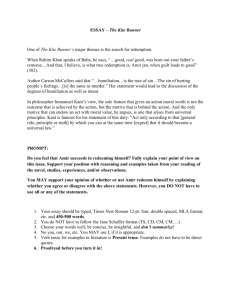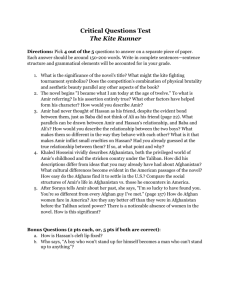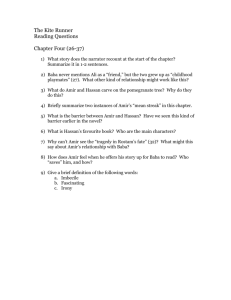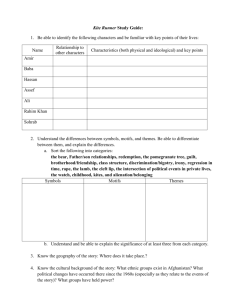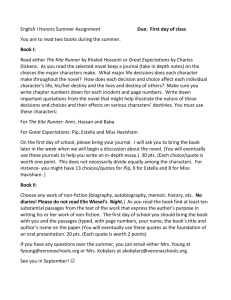Sept. 8-13
advertisement
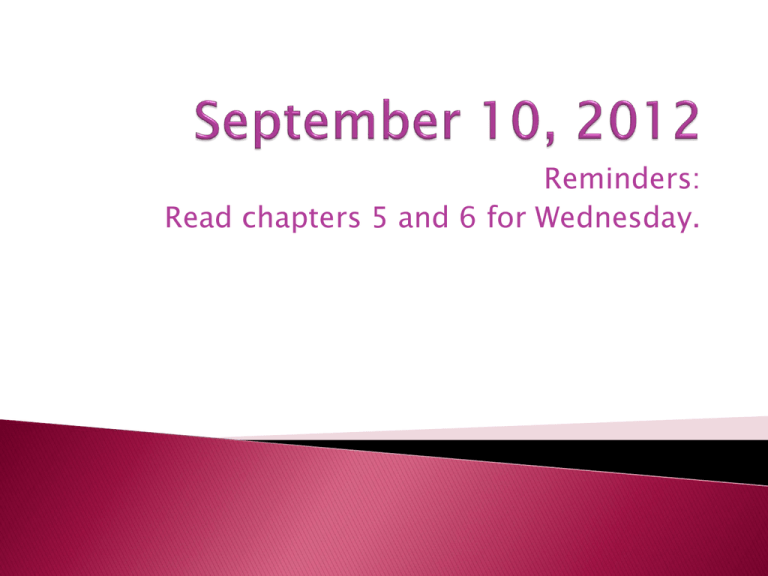
Reminders: Read chapters 5 and 6 for Wednesday. Students will understand the basic history and culture of Afghanistan and analyze the friendship between Amir and Hassan in The Kite Runner by: ◦ Writing a journal entry ◦ Taking notes on basic background information on Afghanistan ◦ Creating a timeline of Afghanistan history with events from the lecture and the novel. ◦ Discussing chapters 1-4 in small groups ◦ Exit ticket Friendship plays a large role in most of our lives. Write about your strongest friendships and what characteristics you value in your friendships. Write down four important characters from The Kite Runner and how they are related. 2 minutes Set it up as Cornell Notes 1/3: Questions/Main Ideas 2/3: Notes Bottom: Summary Afghanista n Based on these maps, what can you say about Afghanistan’s culture? Pastimes: Kite Flying, Picnics, Music Language spoken: Farsi, Arabic, Urdu, Hindi and others Over 17 different ethnic groups in the country ◦ Pashtun, Hazaras People are mostly Muslim, with some Christian and Buddhist ◦ Sunni Muslim ◦ Shi’a Muslim 1700’s: Afghanistan is a modern independent country 1880’s-1920’s: British attempt three unsuccessful invasions of Afghanistan 1920’s-1970’s: Country is ruled by a series of successful kings who modernize the country (build roads, establish women’s rights, reform education) Put a line down the middle with the dates 1960-2001 On the top write: Afghanistan and World Events Below the line, write The Kite Runner 1973: Daoud Khan overthrows the King and begins a communist government 1979: the communist Soviet Union invades Afghanistan 1984-1992: Afghan guerrillas known as the Mujahidin fight a long war against the Soviet Union 1994: The Taliban seizes control of Afghanistan Tomorrow we will look at an article focusing on these events in more detail. Very strict view of the Muslim religion Women’s rights very limited Used forceful punishment against any lawbreakers (beheading, public stoning, etc.) Many national pastimes outlawed (music, celebrations, film, etc.) Buddhas of Bamiyan In your notes: What does this action say bout the Taliban’s view of non-Muslims? No education Lives in a small village Very poor In your notes: What impact did the Taliban have on women? Students will understand the historical connections between the novel and historical events analyze the friendship between Amir and Hassan in The Kite Runner by: ◦ Creating a timeline with historical events and events from the novel. ◦ Discussing chapters 1-4 in small groups ◦ Large group discussion of chapters 1-4 ◦ Exit ticket ◦ Homework: Read though chapter 6 for tomorrow. If your project is on the front table and you want it, please take it with you today. What is redemption? Is there anything a person can not redeem themselves from? Take your comments about the cultural presentations, timeline and The Kite Runner book to your group. (You can take all your stuff, if that is easier.) Introduce yourselves, and share your comments or questions about the cultural presentations with your group members. 1. 2. 3. 4. 5. 6. Kawther, Leah, Yuneisi, Zach, Luis John, Dawit, Jennifer, Cooper, EhSo, Joe Sarah, Achaya, Dorsin, Isabella, Sandra Batoul, Grant, Dahlia, Blake, Sasha, Justin Maribi, Brianna, Elena, Prakash, Sam Hugh, Froilan, Maron, Alexia Add to your timeline ◦ Historical events that happen in The Kite Runner ◦ Plot events that have dates and when they happen in The Kite Runner Why are Hassan and Ali treated poorly? Describe the relationship between Hassan and Amir. What experiences have shaped Amir’s life up to this point? What experiences have shaped Hassan’s life? Are Amir and Hassan friends? Do you agree or disagree with Baba’s statement about sin? “There is only one sin, only one. And that is theft. Every other sin is a variation of theft,” (17). Why? Is Baba a good father? 1. Hawa, Jennifer, Mahamud, Genesis, Joseph T. 2. Heven, Siham, Chansae, Joseph M., Kufto, Shawnie 3. Jesus, Giovanni, Deremiah, Dilfuza, Marcus, Miguel 4. Hannah, Carolina, Arta, Max, Nijah, Antonio 5. Lauren, Jocelyn, Majuma, Phouc, Alejandra, Tyler 6. RJ, Dennise, Sarah, Fernando, Juan, Saje Are Amir and Hassan friends? Is Baba a good father? Read through chapter 6 (chapters 5 and 6 for Wednesday) Be prepared for a Socratic Seminar on the following questions: Are Amir and Hassan friends? Is Baba a good father? Through writing and discussion, students will analyze the characters of Amir and Baba in The Kite Runner by writing an analytical piece and having a Socratic Seminar. Agenda: Analytical essay Socratic Seminar Important quotations--culture Exit Ticket Homework: Read through chapter 8 for Friday Analyze one of the following questions: ◦ Are Amir and Hassan friends? ◦ Is Baba a good father? You may use your book, and make sure you have a clear argument and support. Discussion, Socrates, Sharing ideas, expressing opinions, supporting what you say (quotes, evidence from the text) Respectfully disagree with explanations Why you agree, if you do. Discussion, sharing opinions, not yelling, calm, Give your opinion and back it up with evidence (quotes, specific examples) Know what is going on 1. Speak so that all can hear you. 2. Listen closely. 3. Speak without raising hands. 4. Refer to the text. 5. Talk to each other, not just to the leader. 6. Ask for clarification. Don’t stay confused. 7. Invite and allow others to speak. 8. Consider all viewpoints and ideas. 9. Know that you are responsible for the quality of the seminar. 10: Participate thoughtfully in discussion and use supporting evidence to back your arguments. 8: Participate thoughtfully in discussion, but don’t use supporting evidence. 7: Actively listen, but don’t speak in the discussion. 5: Here, but distracted or “checked out”. Antisocial personality disorder is characterized by a lack of regard for the moral or legal standards in the local culture. There is a marked inability to get along with others or abide by societal rules. Individuals with this disorder are sometimes called psychopaths or sociopaths. Diagnostic Criteria - Mental Health made easy. 1. Since the age of fifteen there has been a disregard for and violation of the right's of others, those right's considered normal by the local culture, as indicated by at least three of the following: A. Repeated acts that could lead to arrest. B. Conning for pleasure or profit, repeated lying, or the use of aliases. C. Failure to plan ahead or being impulsive. D. Repeated assaults on others. E. Reckless when it comes to their or others safety. F. Poor work behavior or failure to honor financial obligations. G. Rationalizing the pain they inflict on others. Did your thoughts on either of these questions change? What new thoughts do you have? Find three important quotes from chapters 16 that illuminate elements of culture in the novel so far. Generate three discussion questions from your group. Discuss elements of culture found so far. What other questions do you have? Through writing and discussion, students will analyze and evaluate Amir’s actions through a close reading of the literary devices and analysis of chapter 7. ◦ ◦ ◦ ◦ ◦ Written analysis questions Discussion of written analysis questions Philosophical chairs Exit ticket Homework: Read through chapter 10 for Monday 1. What is the significance of the memories Amir recalls as he witnesses Hassan’s rape? What do they suggest about his feelings or thoughts? 2. What is the significance of the dream Amir recalls as he witnesses the rape? What does it suggest about his feelings or thoughts? 3. How does the sheep serve as a symbol in the chapter? Why does Amir recall the sheep’s slaughter during the rape? 4. What is the significance of all the gifts Amir receives for his birthday? Are you listening or are you waiting to talk? Philosophical Chairs is a strategy for exploring a controversial topic through student discussion. It is not a debate, but rather an opportunity for students to defend, deepen, and fine-tune their ideas through discussion. 10: Participate thoughtfully in discussion and use supporting evidence to back your arguments. 8: Participate thoughtfully in discussion, but don’t use supporting evidence. 7: Actively listen, but don’t speak in the discussion. 5: Here, but distracted or “checked out”. 1. Amir fears Assef’s violence will be turned against himself if he intervenes. 2. Amir thinks that as a servant and a Hazara, Hassan is less worthy than himself. 3. Amir wants the kite to please Baba and win his affection. If he intervenes, Assef will take the kite. Three rules guide the discussion 1. One person speaks at a time 2. Everyone must have a turn before someone speaks twice. 3. You must repeat what the person on the opposing side said before you share your opinion. What are your feelings toward Amir as a character?
